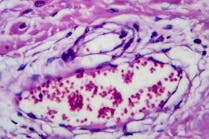The traditional treatment for early-stage non-small cell lung cancer is a lobectomy, where a surgeon eradicates cancerous tissue by removing an entire lung lobe.
Yet, new research finds that select patients with early-stage disease who undergo a less invasive procedure have comparable outcomes, sparking hope for a less aggressive approach to lung cancer surgery. The 10-year study, published in the New England Journal of Medicine and led by University of Chicago Medicine medical oncologist Everett Vokes, MD, adds evidence that supports a new standard to preserve lung tissue in cancer patients whenever possible. In this study, 697 patients with peripheral stage 1 tumors less than 2 centimeters in size were randomly assigned to undergo a lobectomy or a sublobar resection, where part of the cancerous lobe is removed.
In the case of the latter, patients received either a wedge resection, which involves removing a nonanatomic, wedge-shaped piece of tissue containing the tumor, or an anatomical segmentectomy in which surgeons remove the anatomic lung segment with the tumor, along with the small airway, individual artery and vein that feed and drain the region.
After a median follow-up of seven years, the multicenter, phase 3 randomized trial found disease-free survival was similar between lobectomies and sublobar resections. Five-year disease-free survival and five-year overall survival were similar, supporting the less-invasive procedure as the preferred option.





